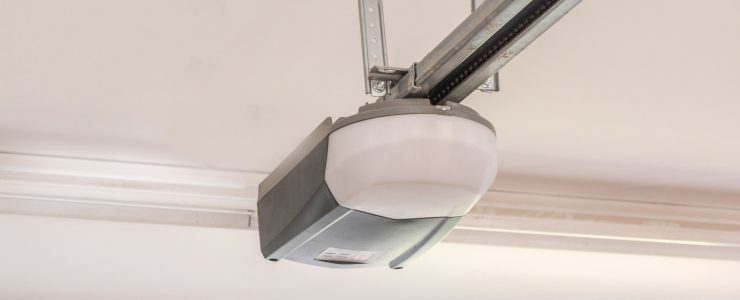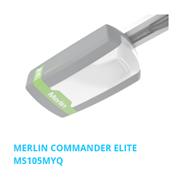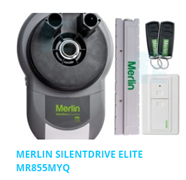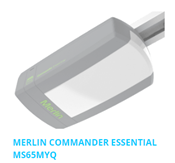Automating your garage door not only adds convenience to your daily life but also enhances the security and functionality of your home. Selecting the right garage door motor is crucial to ensure smooth operation and longevity of your garage door system.
In this guide, we will delve into the most common types of garage door motors, their suitability for sectional, roller and tilt doors, essential considerations when making a choice and why getting the right motor is important.
For specific advice about the right garage door motor for your situation please contact our team at Pinnacle Garage Doors. Our experienced technicians will guide you through selecting the perfect garage door motor for your needs and provide professional installation ensuring compatibility, proper alignment and safety feature activation.
Pinnacle Garage Doors sells and installs the Merlin range of garage door motors.
Understanding the Types of Garage Door Motors
Let’s look at chain, belt and direct drive garage door motors.
Chain Drive Motors
Chain drive motors have been in use for many years and are known for their durability and reliability. While chain drive garage door motors are not necessarily outdated, they are considered a more traditional and older technology compared to some newer alternatives. They use a chain and sprocket system to move the door, making them suitable for lighter-weight sectional or tilt doors.
Here are some considerations regarding chain drive garage door motors:
- Noise Level: One of the primary drawbacks of chain drive motors is their noise level. They tend to produce more noise during operation compared to belt drive motors. This noise can be a concern, especially if the garage is located near living spaces or bedrooms.
- Maintenance: Chain drive motors require regular maintenance, including lubrication of the chain. Failure to perform maintenance can lead to increased noise, wear and tear and potential malfunctions. In contrast, some newer motor types, like belt-drive motors, often require less maintenance.
- Smooth Operation: While chain drive motors are robust and can handle heavy doors, they may not provide as smooth an operation as belt drive motors. The jerky motion during operation can contribute to increased wear and tear over time.
- Affordability: Chain drive garage door motors are generally more affordable compared to their belt drive counterparts. If cost is a significant consideration and noise is not a primary concern, a chain drive motor may be a suitable option.
- Suitability for Specific Doors: Chain drive motors are well-suited for sectional garage doors, but they can also be used with roller and tilt doors. The choice depends on your specific preferences, budget and tolerance for noise.
Belt Drive Motors
Belt drive motors are an excellent option for those who want quiet operation.
These motors use a rubber belt to move the door, making them significantly quieter than chain drive motors. The belt loops around a gear and the motor shaft, pulling the door smoothly and quietly.
While belt drive motors are generally more expensive than chain drive motors, their smooth and quiet performance makes them a popular and worthwhile choice for many homeowners.
Here are some considerations regarding belt drive garage door motors:
- Noise Level: Belt drive motors are known for their quiet operation, making them suitable for garages located near living spaces.
- Maintenance: Belt drive systems generally require less maintenance compared to chain drives. Periodically check the belt for wear and replace it if needed. Lower maintenance needs contribute to long-term efficiency.
- Operation: Belt drive motors provide smooth and vibration-free operation. Evaluate the smoothness and speed of the door’s movement to ensure it aligns with your preferences.
- Affordability: Belt drive motors often come with a higher initial cost compared to chain drives. Assess your budget and weigh the long-term benefits of reduced maintenance and quiet operation.
- Suitability for Specific Doors: Verify that the belt drive motor is suitable for your specific garage door type. Belt drives are compatible with a variety of doors including sectional and roller, but ensure the motor’s horsepower aligns with the weight of your door.
Direct Drive Motors
Direct-drive garage door motors are a space-saving solution for automating garage doors. Unlike traditional belt or chain drive systems, direct drive motors are directly connected to the door shaft, eliminating the need for a belt or chain.
Here are some considerations regarding direct-drive garage door motors:
- Noise Level: Direct-drive garage door motors are known for their quiet operation. The absence of belts or chains reduces noise, making them suitable for garages attached to living spaces.
- Maintenance: Direct drive systems generally require minimal maintenance due to their streamlined design with fewer moving parts. Periodic checks for lubrication and ensuring the door remains in proper alignment are usually sufficient.
- Operation: Direct drive motors provide smooth and efficient operation. The motor eliminates the need for a separate trolley system. Evaluate the system’s speed and overall performance to ensure it meets your expectations.
- Affordability: While direct drive systems offer several advantages, they may come with a higher initial cost compared to some other garage door motor types. Assess your budget and weigh the benefits of reduced maintenance and quiet operation against the upfront expense.
- Suitability for Specific Doors: Direct-drive garage door motors are versatile and compatible with various door types, including sectional and roller doors. Ensure the motor’s lifting capacity matches the weight of your specific garage door.
Matching Motors to Garage Door Types
When matching motors to specific garage door types it’s important to ensure the motor is specifically designed and recommended for the type of door you have.
Apart from the core operating features of the motor, it must have the capacity to smoothly handle the weight and size of your garage door.
Sectional Garage Doors
Sectional garage doors are the most common type, consisting of panels that are hinged together and move vertically along tracks. For sectional doors, all three types of motors—chain drive, belt drive, and direct drive are suitable. The choice depends on your specific preferences, budget and noise tolerance.
Consider: Merlin Commander Elite MS105MYQ
Roller Garage Doors
Roller garage doors are made of horizontal slats that roll up into a compact coil. These doors are best paired with a chain or belt drive motor. The compact and efficient operation of roller doors makes them well-suited for these types of motors. Consider your noise tolerance and budget when choosing between a chain or belt drive motor for your roller garage door.
Consider: Merlin Silent Drive MR855MYQ
Tilt Garage Doors
While tilt-style garage doors were once a common choice, especially in older homes, they are now less frequently found compared to more modern garage door designs such as sectional or roller doors.
Tilt-style garage doors operate by tilting upward and outward from the bottom. Unlike sectional or roller doors, which consist of horizontal panels that roll up along tracks, tilt-style doors are a single, solid piece that pivots on a hinge mechanism.
If needing a motor for a tilt-style garage door chain or belt drive motors are typically compatible.
Consider: Merlin Commander Essential MS65MYQ
Essential Considerations When Choosing a Garage Door Motor
There are several important factors to keep in mind when choosing your garage door motor. Consider the following to ensure the best match between the door and motor and for efficient operation.
Horsepower
The horsepower (HP) of a garage door motor determines its lifting capacity. Larger and heavier doors require more horsepower to operate effectively. Ensure the motor you choose can handle the weight and size of your garage door.
Speed
The speed at which a garage door opens and closes may be a factor for some homeowners. While this is more of a personal preference, it’s worth considering if you want a motor that can operate your garage door at a faster pace.
Safety and Security Features
Look for motors with advanced security features, such as rolling code technology, which changes the access code each time the remote is used. This helps prevent unauthorised access to your garage.
Other safety and security features may include timer-to-close (closes the door after a pre-set amount of time), automatic safety reverse (stops and reverses if an obstruction is detected) and automatic force sensing (monitors and adjusts the force needed to open and close with each operation).
Backup Power
In case of a power outage, having a garage door motor with a battery backup system can be a lifesaver. This feature ensures that you can still open and close your garage door during emergencies or power failures.
Remote Access and Smart Home Integration
Many modern garage door motors offer remote access through smartphones and can be integrated into smart home systems. This allows you to monitor and control your garage door from anywhere, adding an extra layer of convenience and security to your home.
Why Choosing the Right Motor Matters
Investing in the right garage door motor is important for several reasons:
Longevity
The correct motor, matched to the type and weight of your garage door, ensures longevity and reliable operation. Choosing a motor with the appropriate horsepower prevents unnecessary strain on the system, prolonging its lifespan.
Safety
A properly matched motor enhances the safety of your garage door system. It prevents issues such as the door closing too quickly or not stopping when an obstruction is detected. Safety features are particularly crucial if you have pets or children.
Quiet Operation
The right motor ensures quiet and smooth operation, minimising noise disturbances in your living space. This is especially important if your garage is adjacent to living areas or bedrooms.
Enhanced Security
Modern garage door motors come with advanced security features that protect your home from potential intruders. Investing in a motor with rolling code technology and other security measures adds an extra layer of protection to your property.
Convenience
The right motor enhances the overall convenience of using your garage. Features such as remote access, smart home integration, and battery backup systems make daily life more comfortable and stress-free.
Get a Garage Door Motor Quote
Selecting the right garage door motor doesn’t have to be a daunting task. Understanding the different types, considering your needs, and seeking professional help can make the choice simple.
Ready to automate your garage door or upgrade your garage door motor? Contact our team to get a quote and we’ll guide you through the selection process, recommend the right motor for your needs and handle the professional installation.









Your email address will not be published. Required fields are marked *